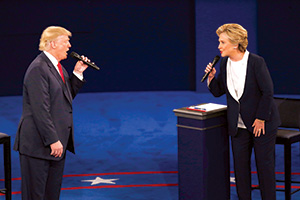Senior Reporter
Clinton, Trump Implored to Secure Road Funding

This story appears in the Oct. 17 print edition of Transport Topics.
America’s next president needs to advance a long-term funding plan to modernize infrastructure and freight corridors to guarantee economic growth for the coming years, industry stakeholders said.
Nearly three dozen transportation groups, ranging from road builders to transit advocates, gave that message in recent letters to the nominees of the two major parties.
“We believe that an infrastructure package needs to include, as a foundation, additional sustainable revenue to ensure the permanent solvency” of the Highway Trust Fund, the groups wrote earlier this month. “The additional revenue sources must be long term, reliable, dedi- cated and focused on the users and beneficiaries of our transportation network to support the increased investment provided under your infrastructure proposal.”
With less than a month before the election, Democratic nominee Hillary Clinton and Republican nominee Donald Trump have not spoken at length about infrastructure. Clinton proposed a five-year, $275 billion proposal to finance large-scale infrastructure and freight-connectivity projects. Trump said his proposal would be twice as large as Clinton’s plan.
Also, each has differing energy policies.
The transportation groups said a funding uncertainty for big-ticket infrastructure projects at the federal level has “had dramatic negative effects on the ability of state and local governments to plan, fund and construct transportation projects.”
“As a consequence, the economy has missed an opportunity to increase good-paying jobs and has hampered America’s economic competitiveness,” the letter’s signatories said.
American Trucking Associations, the American Road and Transportation Builders Association, the Association of Equipment Manufacturers, the National Stone Sand and Gravel Association and the U.S. Chamber of Commerce were among the groups backing the letter. Most of them, including ATA, have called on Congress to raise taxes on fuels to realize the trust fund’s long-term viability. In the letters, they offered their “collective expertise” to assist in formulating and implementing an infrastructure agenda.
“Our organizations are a small sample of the diverse coalition of stakeholders willing to join you in securing a long overdue and meaningful transportation infrastructure investment plan,” they added.
A new administration will need Congress’ help in achieving long-term funding goals for infrastructure. Transportation leaders on Capitol Hill have yet to propose a long-term funding plan for the trust fund, which received a five year lifeline from a 2015 highway law. That law relied on nontransportation accounts to boost the fund.
The Highway Trust Fund is used by the U.S. Department of Transportation to help states pay for infrastructure projects. The fund is kept alive with dwindling revenue from the federal 18.4-cents-per-gallon gas tax and 24.4-cents-per-gallon diesel tax, as well as supplemental funding authorized by Congress.
According to the American Society of Civil Engineers, an investment of $3.3 trillion is needed over the next 10 years to ensure sound infrastructure nationwide.
“Facilities in poor condition lead to increases in operating costs for trucks, cars and rail vehicles,” according to an ASCE report released in May.
Unlike infrastructure, energy has been prominently discussed in debates and on the campaign trail. The presidential nominees take different approaches to achieve their energy plans.
Clinton has promoted a renewable agenda rooted on minimizing the carbon footprint of industries and consumers. Solar energy, biofuels and wind energy programs are touted by Clinton. She also pledged to push efforts to decrease methane emissions, and cut billions of dollars in tax subsidies for oil and gas companies.
Trump has vowed to greenlight the vast production of oil and coal. Specifically, he pledges to make accessible onshore and offshore leasing on federal lands, do away with a moratorium on coal leasing and open shale energy deposits to industry. Doing so, Trump explained on his campaign website, would promote energy independence from the Organization of the Petroleum Exporting Countries and other countries.
Clinton opposes construction of the Keystone XL pipeline, and Trump supports it. In 2015, the Obama administration halted work on the pipeline, which would have transported crude oil from Canada to Houston.

